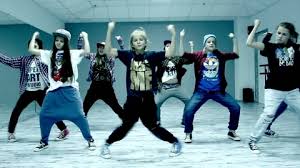Conversation A
對(duì)話A
Susie: How do you know which group has the best skills when dancing?
蘇西:跳舞的時(shí)候,你怎么知道哪個(gè)團(tuán)隊(duì)的技巧最棒?
Rob: The judges watch all the groups and decide. Or sometimes the fans decide.
羅布:裁判會(huì)看所有的團(tuán)體,然后做出決定。或者有時(shí)候是由粉絲決定的。
Susie: How does that work?
蘇西:大家要如何決定呢?
Rob: Groups dance one after the other. After the groups have danced, the audience decides which is best.
羅布:團(tuán)體會(huì)一個(gè)接一個(gè)跳舞。在團(tuán)體跳完之后,觀眾們會(huì)決定哪組最棒。
Susie: How do they do that?
蘇西:他們會(huì)怎么做?
Rob: By cheering loudest for the group they liked best.
羅布:通過為他們最喜歡的團(tuán)體發(fā)出最大聲的歡呼。

Conversation B
對(duì)話B
James: Wow, that dance class was hard. I'm all out of breath.
詹姆斯:哇,剛才的跳舞課太難了。我都喘不上來氣了。
Alex: I'm not surprised. But the more you dance, the easier and more fun it gets.
阿萊克斯:我一點(diǎn)兒也不驚訝。但是你跳得次數(shù)越多,就會(huì)越輕松、越有趣。
James: I hope so. My muscles are going to be sore tomorrow.
詹姆斯:希望如此。我的肌肉明天會(huì)很疼的。
Alex: Dancing is good for your health. It helps you get fit.
阿萊克斯:跳舞對(duì)你的健康有益。會(huì)幫助你塑型。
James: That's true. I think I'll come here more often in the future.
詹姆斯:沒錯(cuò)。我想我以后會(huì)經(jīng)常來這里的。
Alex: That's great.
阿萊克斯:那太好了。











